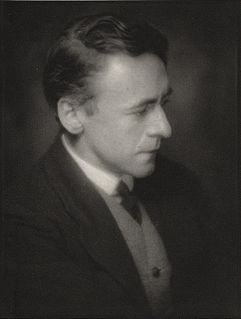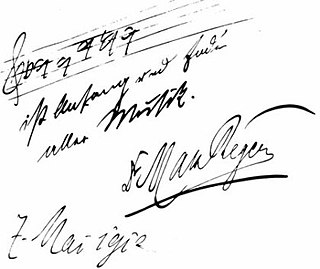Toy Symphony may refer to:
- Toy Symphony, a musical composition of unknown authorship dated to the 1760s
- Toy Symphony (Arnold) (1957), a musical composition by Malcolm Arnold
- Toy Symphony (play) (2007), by Malcolm Gow
Toy Symphony may refer to:
Syncopation is a musical term meaning a variety of rhythms played together to make a piece of music, making part or all of a tune or piece of music off-beat. More simply, syncopation is "a disturbance or interruption of the regular flow of rhythm": a "placement of rhythmic stresses or accents where they wouldn't normally occur". It is the correlation of at least two sets of time intervals.

Sir William Turner Walton was an English composer. During a sixty-year career, he wrote music in several classical genres and styles, from film scores to opera. His best-known works include Façade, the cantata Belshazzar's Feast, the Viola Concerto, the First Symphony, and the British coronation marches Crown Imperial and Orb and Sceptre.

Sir Arnold Edward Trevor Bax, KCVO was an English composer, poet, and author. His prolific output includes songs, choral music, chamber pieces, and solo piano works, but he is best known for his orchestral music. In addition to a series of symphonic poems he wrote seven symphonies and was for a time widely regarded as the leading British symphonist.

Malcolm Benjamin Graham Christopher Williamson, AO, CBE was an Australian composer. He was the Master of the Queen's Music from 1975 until his death.

In music, the BACH motif is the motif, a succession of notes important or characteristic to a piece, B flat, A, C, B natural. In German musical nomenclature, in which the note B natural is named H and the B flat named B, it forms Johann Sebastian Bach's family name. One of the most frequently occurring examples of a musical cryptogram, the motif has been used by countless composers, especially after the Bach Revival in the first half of the 19th century.

Sir Malcolm Henry Arnold was an English composer. His works feature music in many genres, including a cycle of nine symphonies, numerous concertos, concert works, chamber music, choral music and music for brass band and wind band. His style is tonal and rejoices in lively rhythms, brilliant orchestration, and an unabashed tunefulness. He wrote extensively for the theatre, with five ballets specially commissioned by the Royal Ballet, as well as two operas and a musical. He also produced scores for more than a hundred films, among these The Bridge on the River Kwai (1957), for which he won an Oscar.

David Arnold is an English film composer whose credits include scoring five James Bond films, as well as Stargate (1994), Independence Day (1996), Godzilla (1998) and the television series Little Britain and Sherlock. For Independence Day he received a Grammy Award for Best Instrumental Composition Written for a Motion Picture or for Television and for Sherlock he, and co-composer Michael Price, won a Creative Arts Emmy for the score of "His Last Vow", the final episode in the third series. Arnold scored the BBC / Amazon Prime series Good Omens (2019) adapted by Neil Gaiman from his book Good Omens, written with Terry Pratchett. Arnold is a fellow of the British Academy of Songwriters, Composers and Authors.
Four Scottish Dances (Op.59) is an orchestral set of light music pieces composed by Malcolm Arnold in 1957 for the BBC Light Music Festival.
Vernon George "Tod" Handley was a British conductor, known in particular for his support of British composers. He was born of a Welsh father and an Irish mother into a musical family in Enfield, Middlesex. He acquired the nickname "Tod" because his feet were turned in at his birth, which his father simply summarised: "They toddle". Handley preferred the use of the name "Tod" throughout his life over his given names.

A Survivor from Warsaw, Op. 46, is a cantata by the Los Angeles-based Austrian composer Arnold Schoenberg, written in tribute to Holocaust victims. The main narration is unsung; "never should there be a pitch" to its solo vocal line, wrote the composer.
The Toy Symphony is a musical work dating from the 1760s with parts for toy instruments, including toy trumpet, ratchet, bird calls, Mark tree, triangle, drum and glockenspiel. It has three movements and typically takes around seven minutes to perform.
George Hurst was a British conductor.
Andrew Jonathan Penny MBE is an English conductor. He has recorded a complete cycle of Malcolm Arnold's symphonies.

The Symphony No. 8, Op. 124 by Malcolm Arnold was finished in November 1978.
Raphael Dominique Thoene is a German composer and musicologist.
Christopher Fifield is an English conductor and classical music historian and musicologist based in London.
Arthur Dennington was a British conductor and composer.
The Toy Symphony, Op. 62, is a symphony scored for strings, piano and toy instruments, composed by Malcolm Arnold in 1957. The instruments specified are: quail whistle, cuckoo whistle, trumpet in F, trumpet in C, trumpet in G, three dulcimers, triangle, cymbal and drum, with piano and string quartet.
In music, Op. 62 stands for Opus number 62. Compositions that are assigned this number include:
Peterloo, Op. 97, is a concert overture by Malcolm Arnold written in 1968 to commemorate the centenary of the first meeting of the Trades Union Congress. It is a programme piece which depicts the Peterloo Massacre of 1819. It was given a mixed reception by critics, but has nevertheless become one of Arnold's best-known works, being arranged several times for wind or brass band, recorded many times, and played twice at the Proms, once in its original form and once in a choral arrangement to words by Sir Tim Rice.